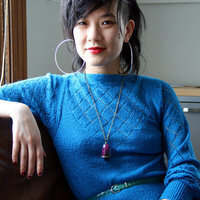- About
- News & Communications
- Programs & Events
- Get in Touch
Back to Top Nav
Back to Top Nav
Back to Top Nav
Back to Top Nav
A Talk and Discussion with Mimi Thi Nguyen, Associate Professor of Gender and Women's Studies and Asian American Studies at the University of Illinois, Urbana-Champaign

Mimi Thi Nguyen is Associate Professor of Gender and Women's Studies and Asian American Studies at the University of Illinois, Urbana-Champaign. Her first book, called The Gift of Freedom: War, Debt, and Other Refugee Passages, focuses on the promise of “giving” freedom concurrent and contingent with waging war (Duke University Press, 2012; Outstanding Book Award in Cultural Studies from the Association of Asian American Studies, 2014). She is also co-editor with Fiona I.B. Ngo and Mariam Lam of a special issue of positionson Southeast Asian American Studies (20:3, Winter 2012), and co-editor with Thuy Linh Nguyen Tu of Alien Encounters: Pop Culture in Asian America (Duke University Press, 2007). Her papers have been solicited for the Feminist Theory Archive at Brown University.
This talk draws from her following project, The Promise of Beauty, and argues that beauty is a fruitful concept through which we engage narratives of crisis. Such narratives name an ongoing condition or an irruptive event through which the discrepancy between the world and what ought to be so often unfolds through citing beauty –whether found in children, coral reefs, art, or rights— and what threatens its continued presence. It is on these grounds that the meeting with beauty in a bad situation lends itself to thoroughly political observation. Following and departing from philosophical and aesthetic concepts of beauty as a horizon for life, Nguyen proposes the concept of the promise of beauty as a diagnosis of the conditions beauty requires to flourish, with and against the threat of its disappearance or destruction; and as call to action to transform those conditions to sustain such life that the beautiful promises to us. That is, the promise of beauty can engender a critique of social arrangements and political structures, and also call for the reorganization of arrangements and structures in our promise tobeauty – to replicate, preserve, or repair beauty, among other fulfillments. Or as Toni Morrison put so well, “Beauty was not simply something to behold, it was something one could do."
Events are free and open to the public unless otherwise noted.